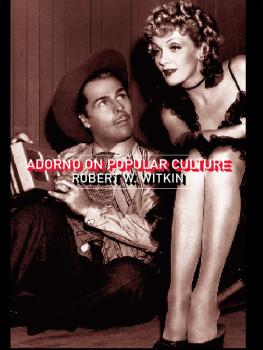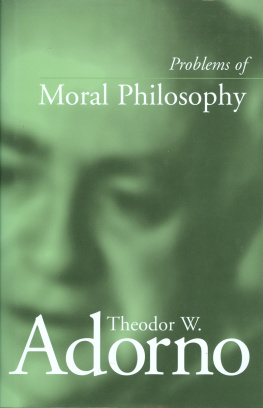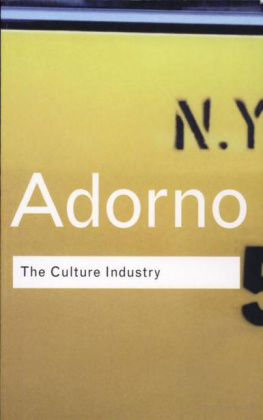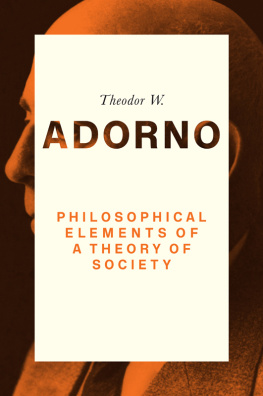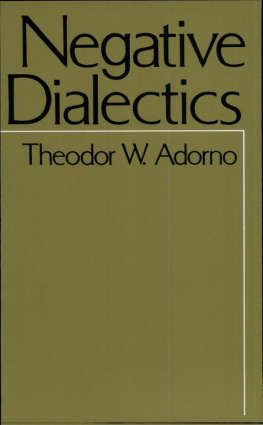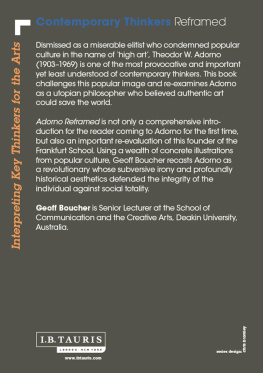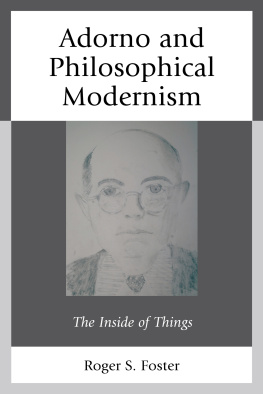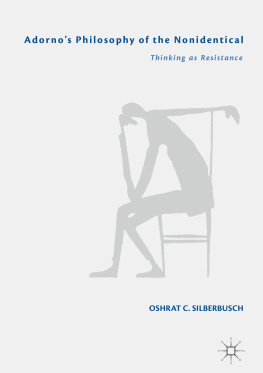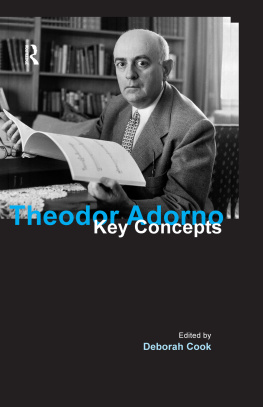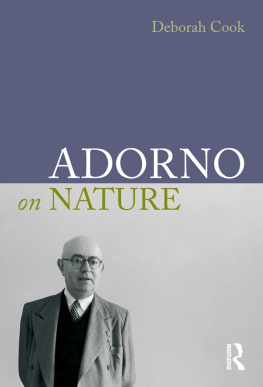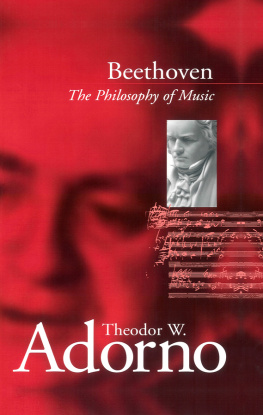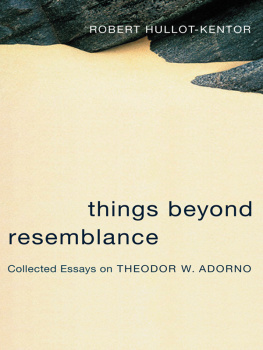ADORNO AND DEMOCRACY
ADORNO
AND
DEMOCRACY
THE AMERICAN YEARS
SHANNON L. MARIOTTI

Due to variations in the technical specifications of different electronic reading devices, some elements of this ebook may not appear as they do in the print edition. Readers are encouraged to experiment with user settings for optimum results.
Copyright 2016 by The University Press of Kentucky
Scholarly publisher for the Commonwealth,
serving Bellarmine University, Berea College, Centre College of Kentucky, Eastern Kentucky University, The Filson Historical Society, Georgetown College, Kentucky Historical Society, Kentucky State University, Morehead State University, Murray State University, Northern Kentucky University, Transylvania University, University of Kentucky, University of Louisville, and Western Kentucky University.
All rights reserved.
Editorial and Sales Offices: The University Press of Kentucky
663 South Limestone Street, Lexington, Kentucky 40508-4008
www.kentuckypress.com
An earlier version of part of were published as Adorno on the Radio: Democratic Leadership as Democratic Pedagogy, in Political Theory 42, no. 4 (2014).
Library of Congress Cataloging-in-Publication Data
Names: Mariotti, Shannon L. (Shannon Lee), author.
Title: Adorno and democracy : the American years / Shannon L. Mariotti.
Description: Lexington, Kentucky : University Press of Kentucky, 2016. |
Includes bibliographical references and index.
Identifiers: LCCN 2016011183| ISBN 9780813167336 (hardcover : alk. paper) |
ISBN 9780813167404 (pdf) | ISBN 9780813167398 (epub)
Subjects: LCSH: Adorno, Theodor W., 1903-1969. | DemocracyPhilosophy. |
DemocracyUnited States.
Classification: LCC B3199.A34 M28 2016 | DDC 320.092dc23
LC record available at http://lccn.loc.gov/2016011183
This book is printed on acid-free paper meeting the requirements of the American National Standard for Permanence in Paper for Printed Library Materials.

Manufactured in the United States of America.

| Member of the Association of
American University Presses |
To David, again and always.
To our son, Walter Robert Rando,
who came into the world alongside this book.
Contents
Preface
A considerable part of the leading German intelligentsia, including Adorno, have taken up residence in the Grand Hotel Abyss... a beautiful hotel, equipped with every comfort, on the edge of an abyss, of nothingness, of absurdity. And the daily contemplation of the abyss between excellent meals or artistic entertainments, can only heighten the enjoyment of the subtle comforts offered.
Georg Lukcs, The Theory of the Novel
Horkheimer: What view, for example, are we to take of America? Adorno: We have to believe that things can come out right in the end.
Theodor Adorno and Max Horkheimer, Towards a New Manifesto
Gloomy. Pessimistic. Apolitical. Elitist. Escapist. Withdrawn. An aesthete. A cultural mandarin. Until very recently, any time Theodor W. Adorno was mentioned, one of these descriptions usually accompanied his name. Georg Lukcss now famous characterization of Adorno, noted above, is worth recalling because of how it has captured the various justifications for excluding Adorno from meaningful conversations about politics and democracy, much less political theory and democratic theory. The works that Adorno is most well known for in the Anglophone world, Dialectic of Enlightenment and the writings collected as The Culture Industry, have been received in ways that paint their author as a relentlessly negative critic of modern society who has nothing productive to say about political action, citizenship, or democracy. After all, what could be positive about a thinker who wrote a book titled Negative Dialectics? This impression of pessimism and elitism is only intensified if the United States is brought into the equation. As the story goes, Adorno, a German Jew, was exiled to the cultural wasteland of America during World War II, and here he composed Dialectic of Enlightenment and the writings on the culture industry, as well as the collection of aphorisms titled Minima Moralia: Reflections from Damaged Life. This conventional framing of Adorno, familiar to anyone who studies critical theory, serves to justify dismissing him as a politically relevant thinker, much less as someone who sought to inform the everyday practice of democracy in the United States. How could this gloomy, pessimistic resident of the Grand Hotel Abyss have anything valuable to say about American democracy?
This book will illuminate a very different Adorno, one who is often surprising in both style and substance. My research presents Adorno as not just a social theorist, but a political theorist, and not just a political theorist, but a democratic theorist. Adorno and Democracy shows how he puts forward a valuable theory and practice of democracy that advocates for a specific type of democratic leadership in the form of democratic pedagogy. Not only does Adorno argue for this combined practice of critique and pedagogy, but he also enacts it himself to give us an example of a mode of democratic leadership that is uniquely adapted to navigating the dangers, threats, and pathologies of modernity. The Adorno presented in this book not only rejects any kind of apolitical retreat, but also addresses the pathologies of existing (so-called) democracy in America to better inform a more meaningful, substantive, and robust future practice of democratic citizenship.
The second epigraph quoted above gives us a new picture of Adorno that comes into focus through analyzing a set of largely unexplored texts that he composed originally in English and directed toward an American audience: these are the works that are the focus of this book. The reader may be struck by the thought that the passage I quote does not even sound like the Adorno we have come to know. Indeed, the essays, books, and radio addresses that Adorno and Democracy analyzes show us just how partial that conventional image of Adorno was all along. In different ways, this project complicates and completes our picture of him, forcing us to contemplate some tensions between these two Adornos, but mostly allowing us to see overall consistencies throughout the early and late Adorno, the American and German Adorno, the practical and theoretical Adorno, the Adorno who was broadcast on the radio and the Adorno who wrote Negative Dialectics in dense, difficult language geared toward the specialist. The portrait of Adorno presented here makes us rethink a figure we think we know. We are at a point where we have resources available to begin to piece together Adornos own democratic theory and practice. So this book raises the bar for thinking about Adornos politics, moving beyond the stage of asserting that he has one and toward articulating what it looks like in action.
None of the existing scholarship makes the two primary (and linked) assertions this book will prove: first, that Adorno has a political theory that runs through his corpus and finds the most sharply distilled expression in his thoughts on democratic leadership as democratic pedagogy; and, second, that Adorno develops this positive democratic project in his writings on American political culture. There are limits to existing attempts to recuperate the political aspects of Adornos work, and even the scholarship that is invested in reshaping the traditional image of a gloomy, apolitical Adorno does not go far enough. As the writings I will explore show, Adorno was deeply critical of liberalism and liberal democracy, but not democracy per se. He directed his skepticism toward existing forms of it, but he did not reject democracy in a wholesale way. Indeed, he wanted to encourage the development of the nascent substantive forms of democracy that he recognized in the practice of citizens in the United States.
Next page

